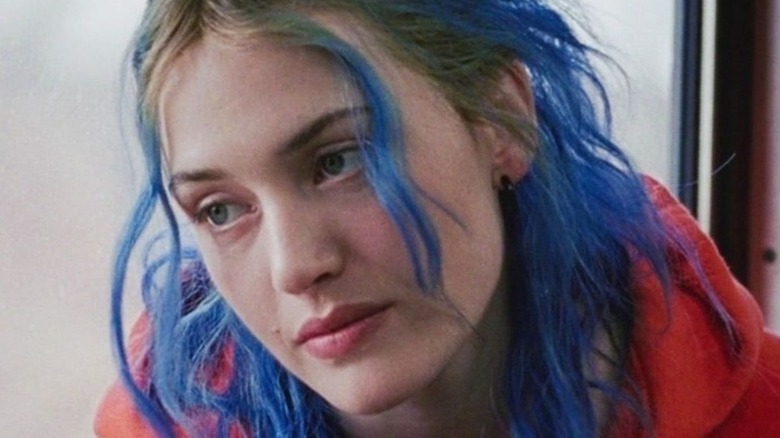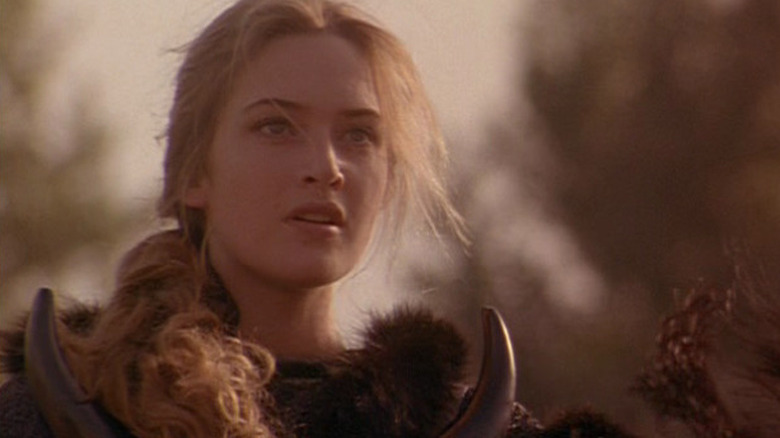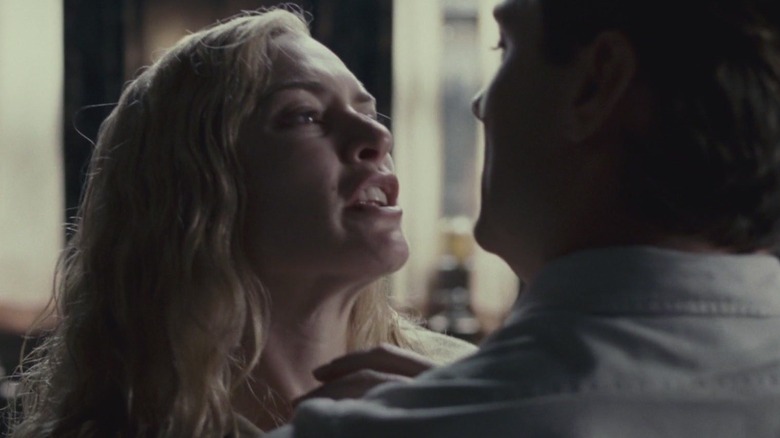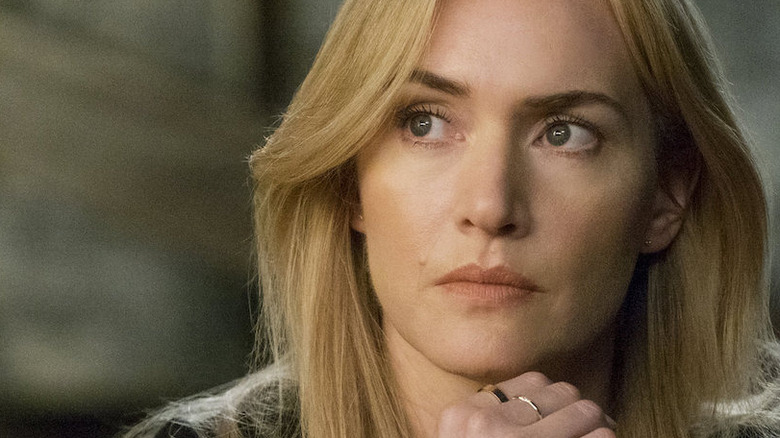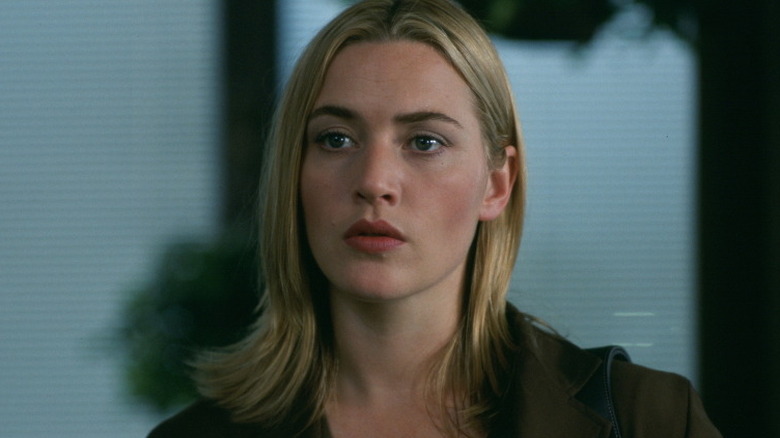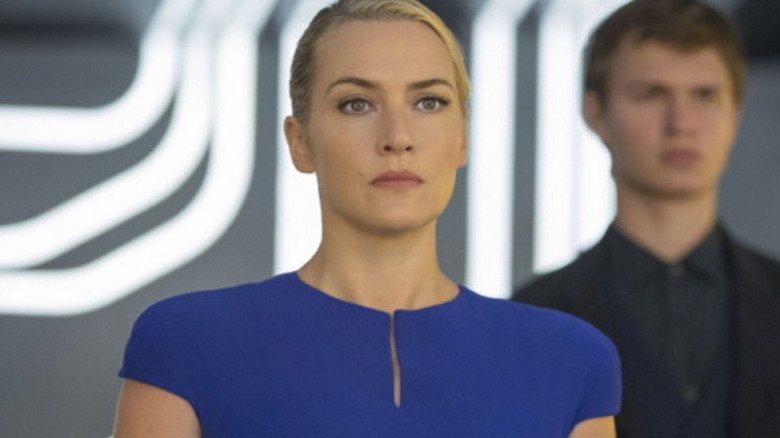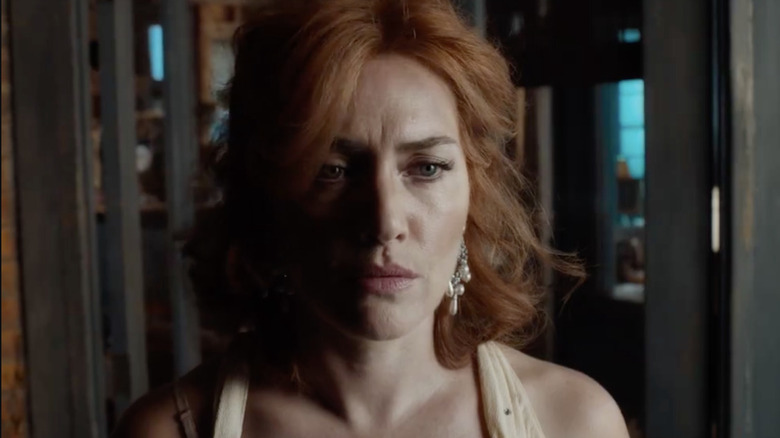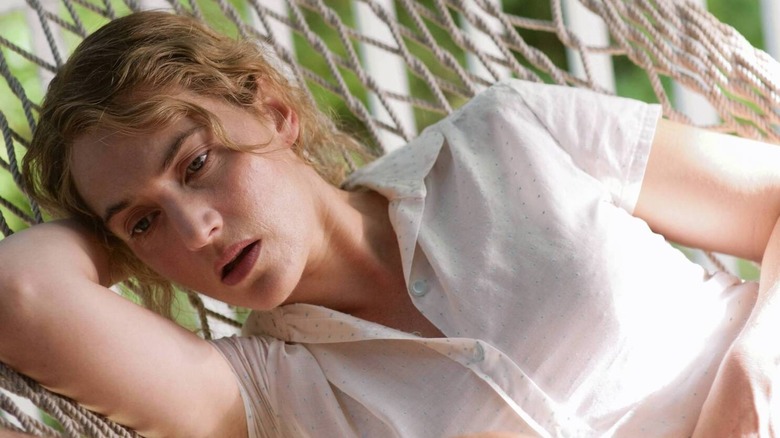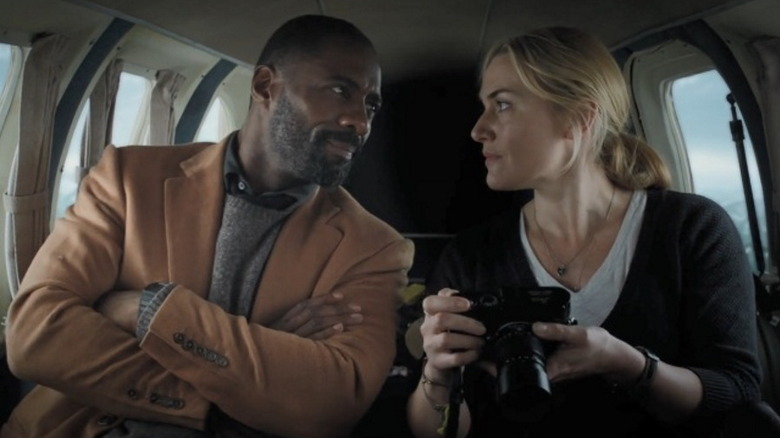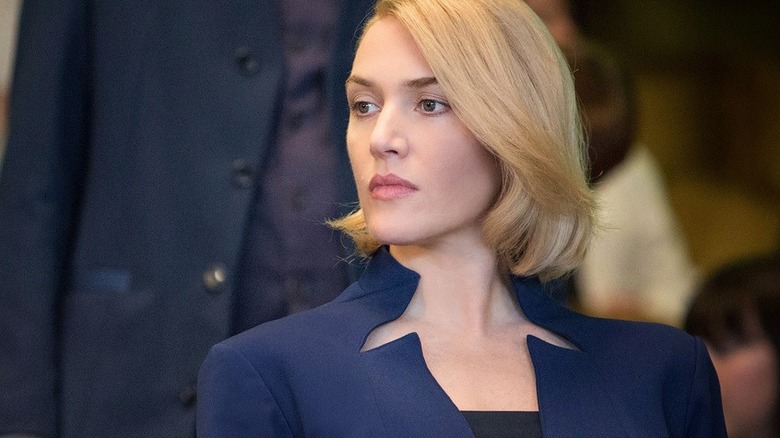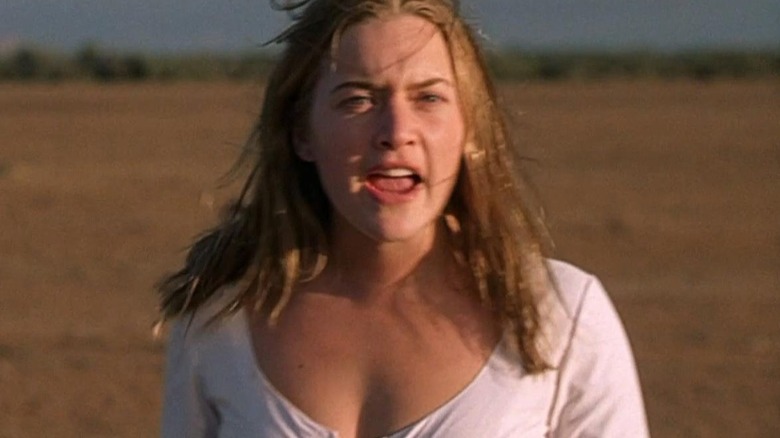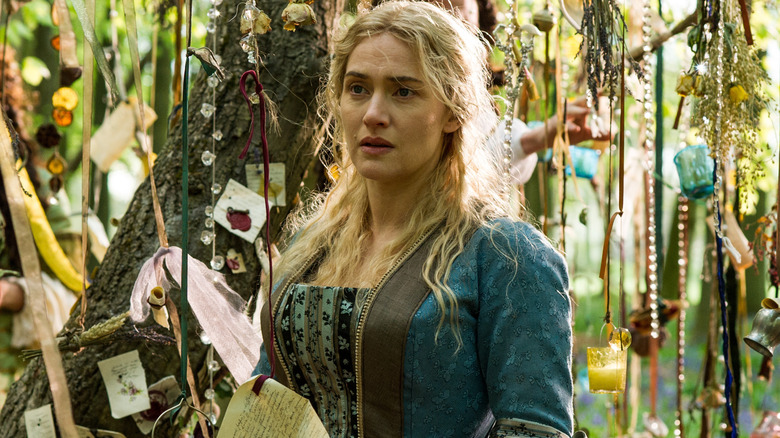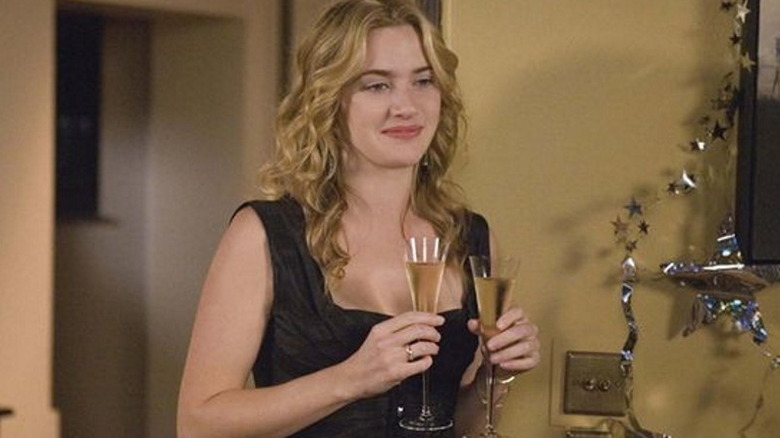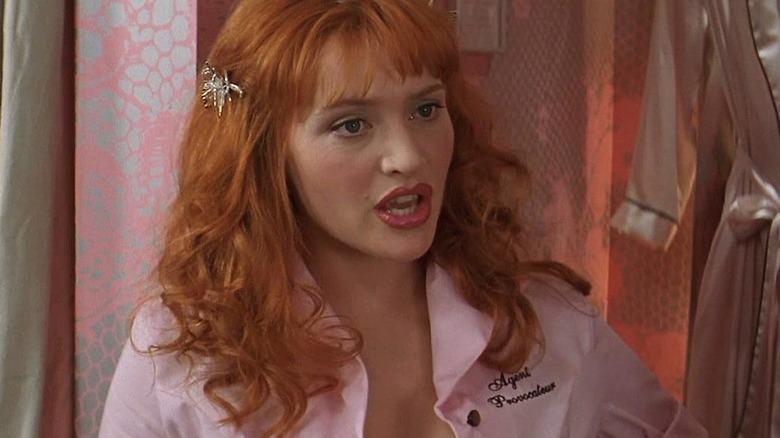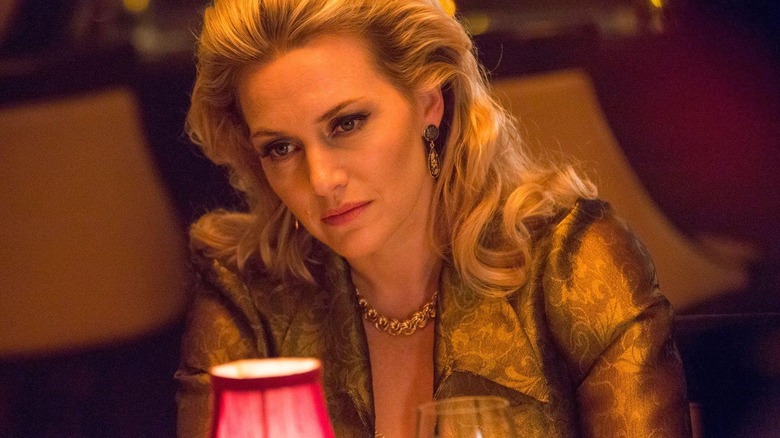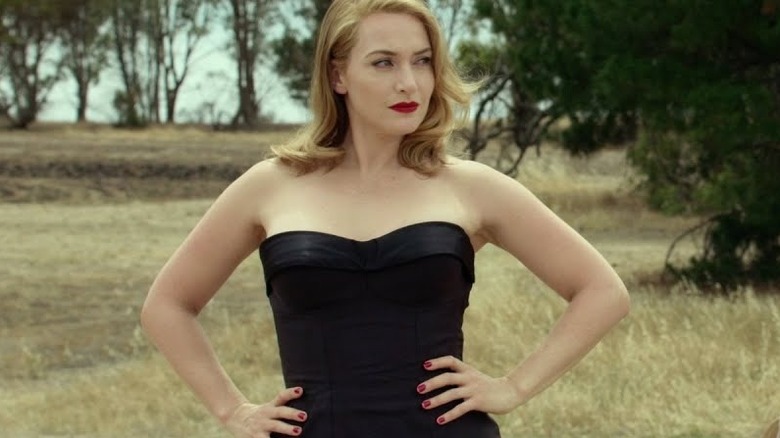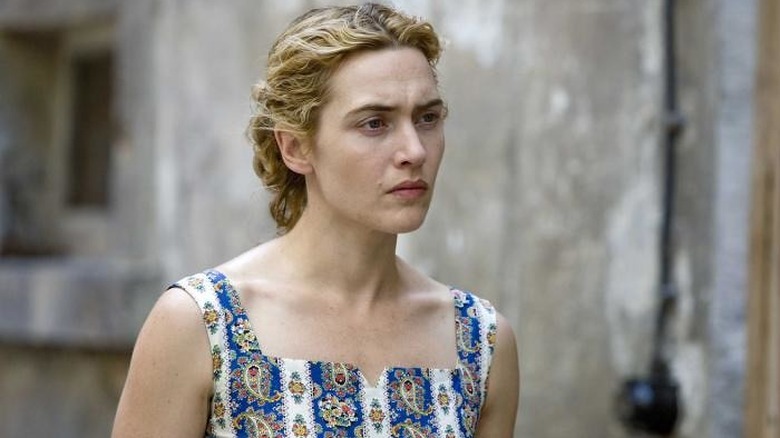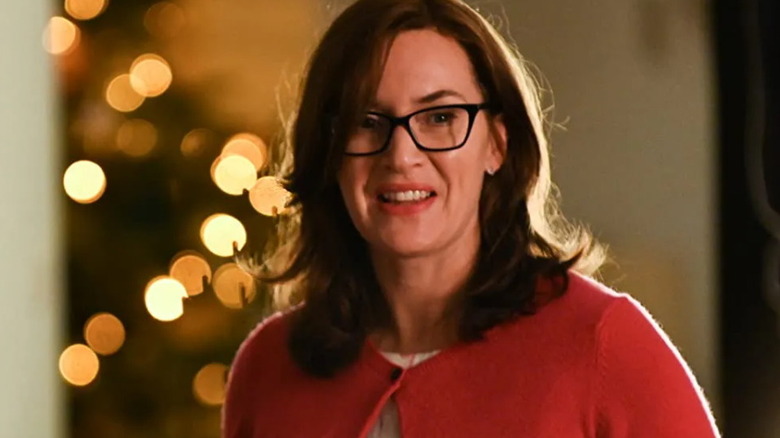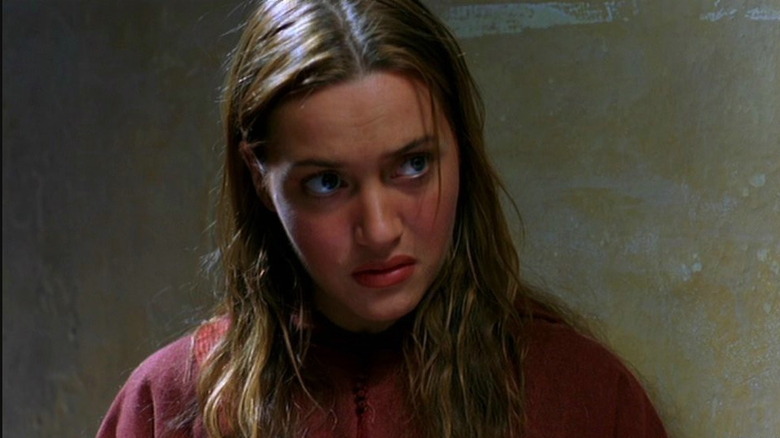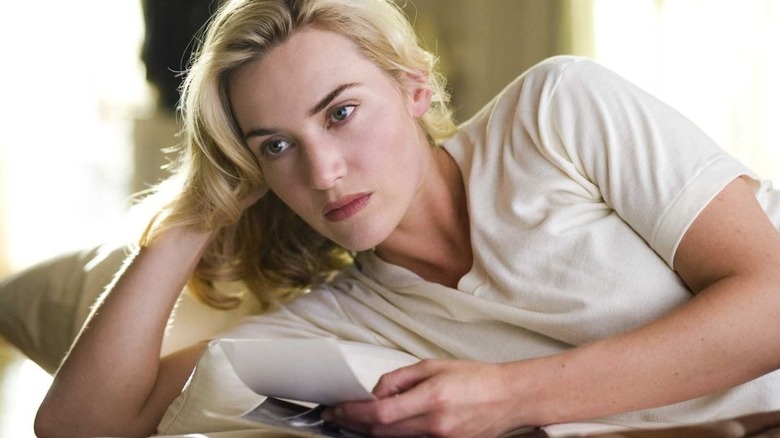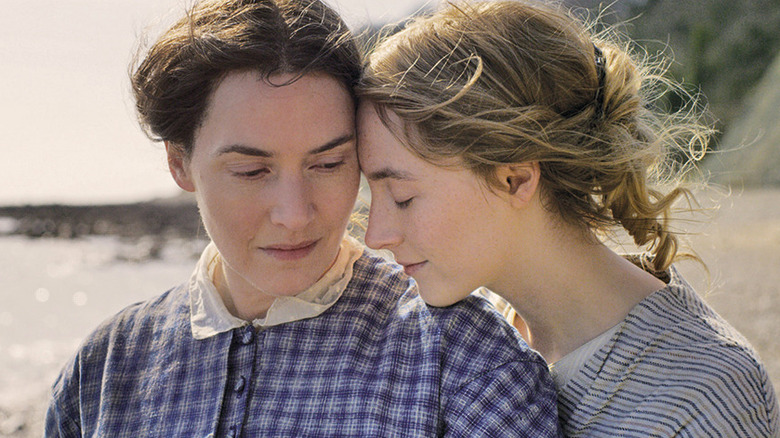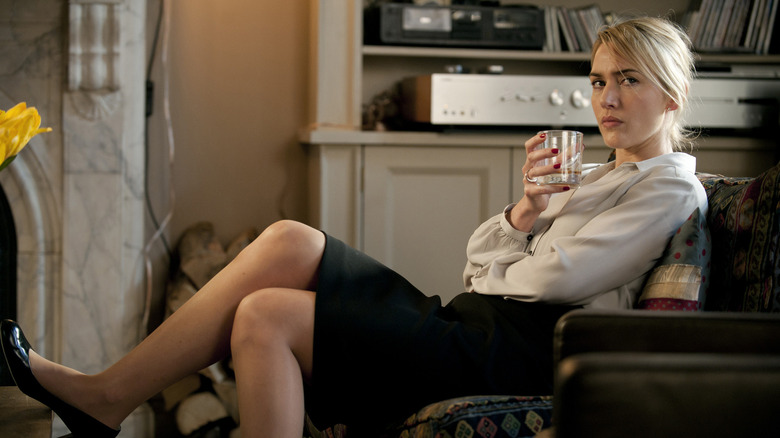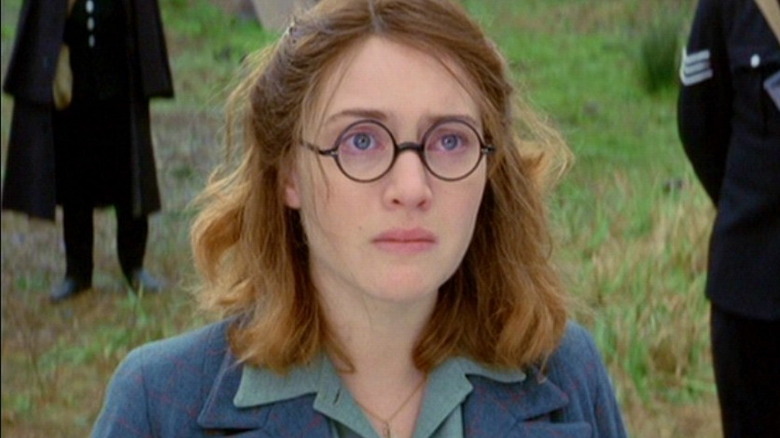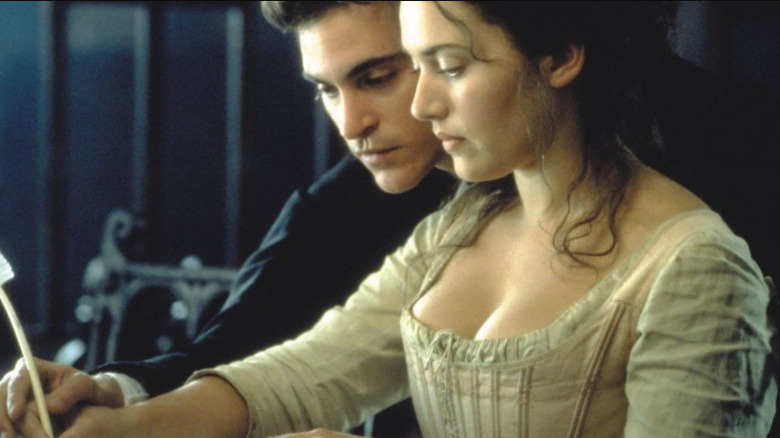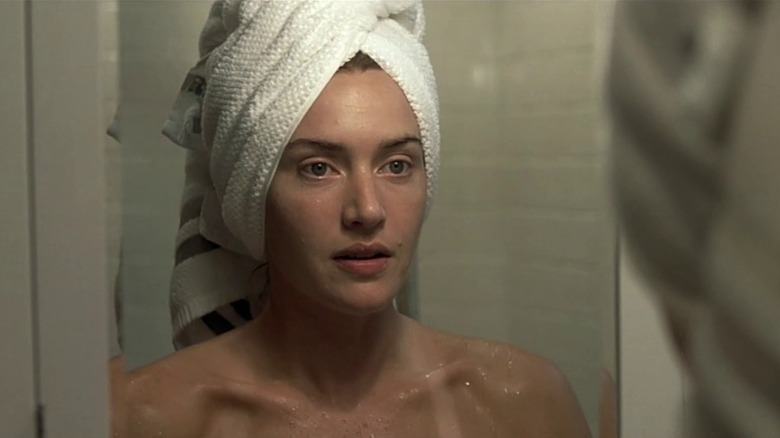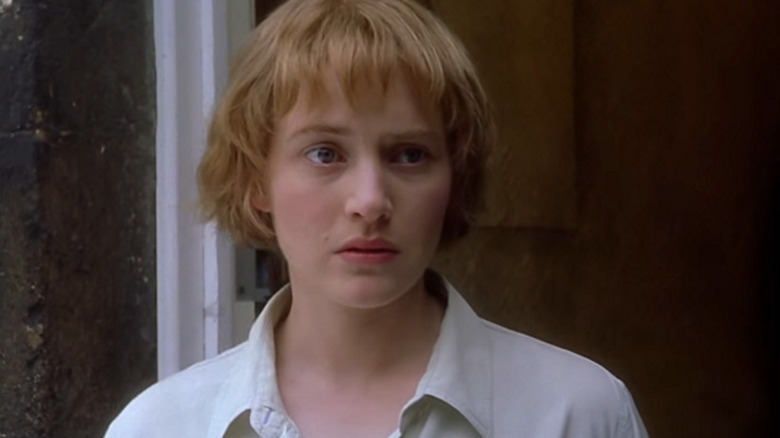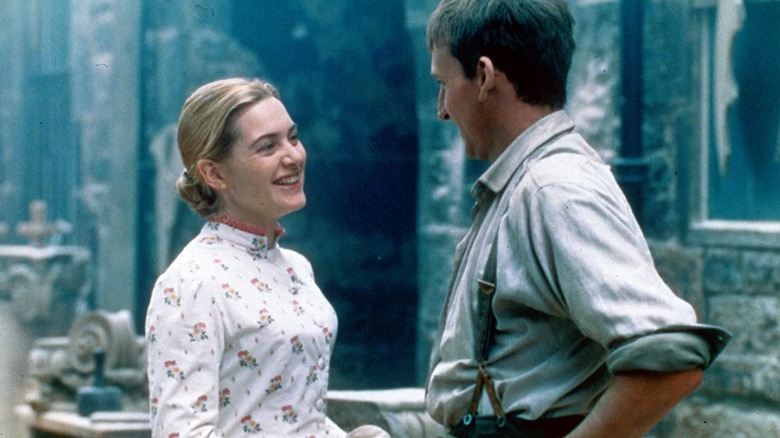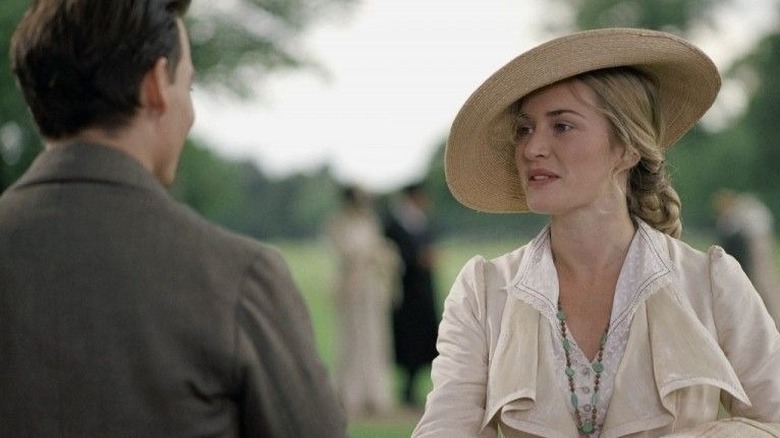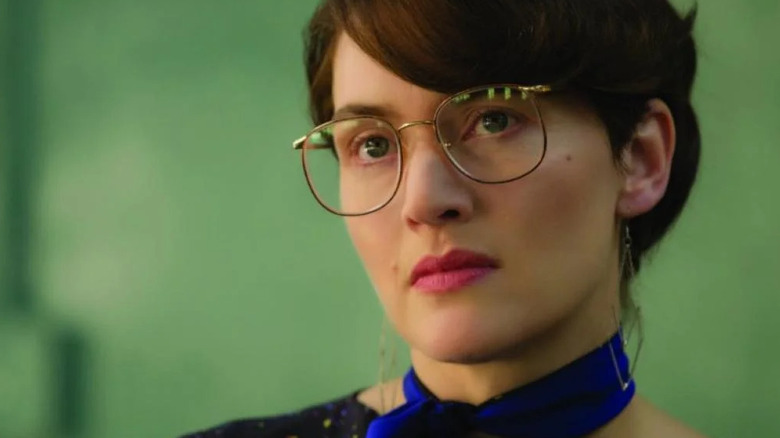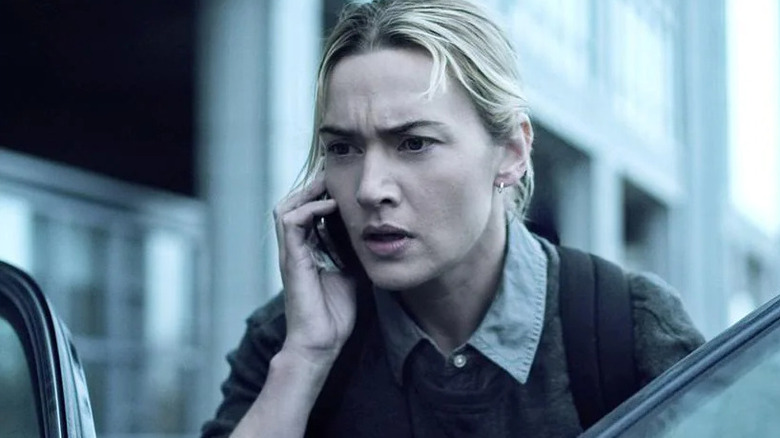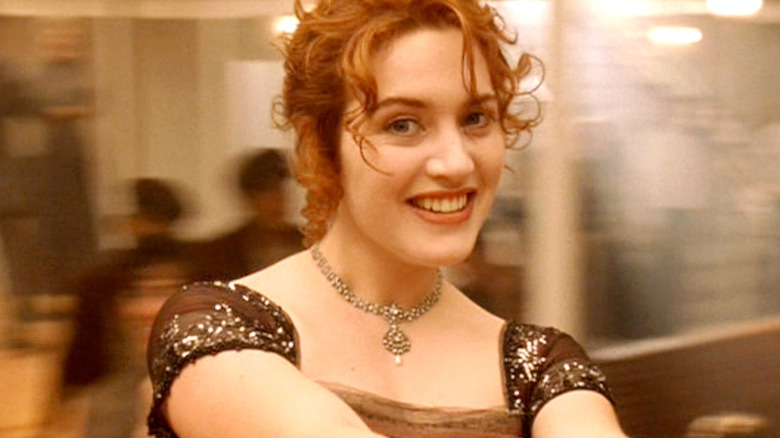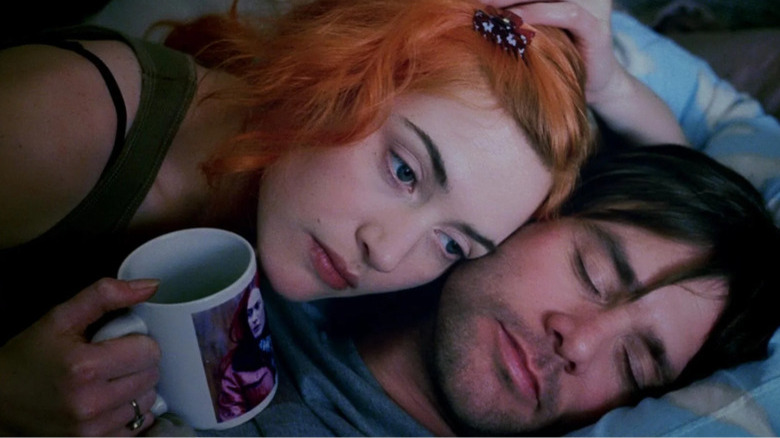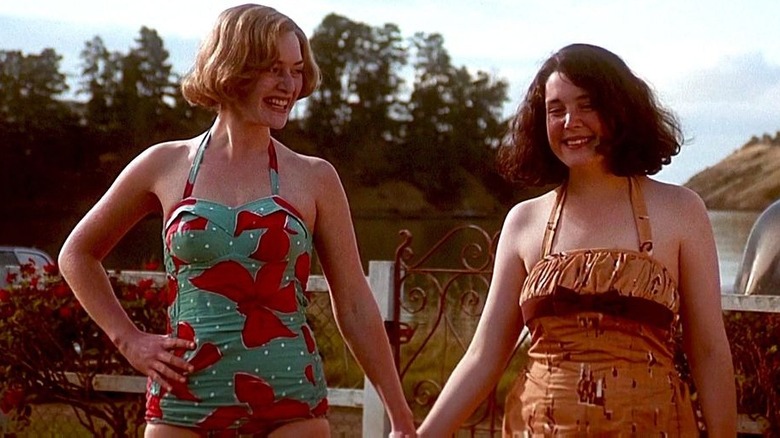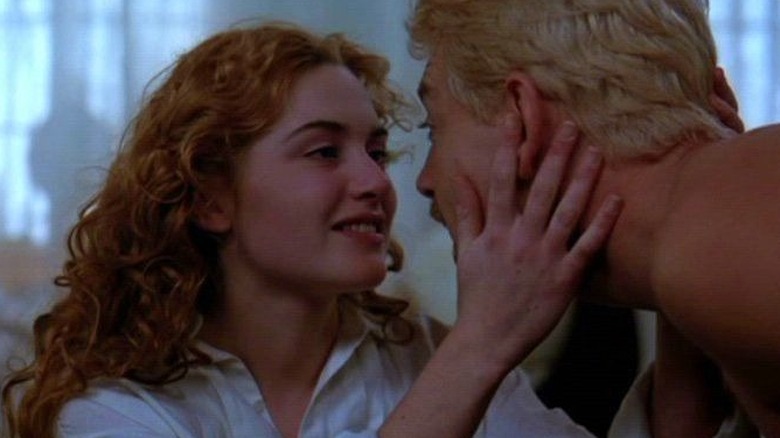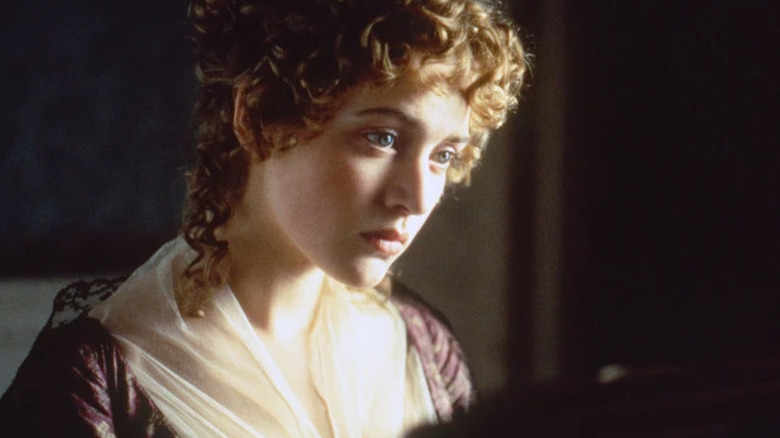Every Kate Winslet Movie Ranked Worst To Best
Would it surprise you to learn that Kate Winslet is British? Fans of the recent word-of-mouth hit show "Mare of Easttown," along with those who think of Winslet as Clementine from "Eternal Sunshine of the Spotless Mind, " might be shocked to learn she's not American. Ever since her star-making turn in "Titanic," one of the highest-grossing movies of all time, Winslet has made a point of shapeshifting into roles that are unlikable, difficult, or obscure. Her early success allowed her to make an entire career out of wholly committing to interesting, dynamic characters that don't rely on celebrity star power. She doesn't have a fashion line or a reality show, nor does she maintain any kind of social media. Kate Winslet keeps to herself — or she acts.
To love Kate Winslet is to stop seeing her and get lost in the characters she plays. She brings a deep, complex reality to her roles, no matter the tone of the film, and is as vital a part of the casting of the cinematic spell as a movie's script or cinematography. She's been nominated for a whopping seven Oscars, winning just one, which seems absurdly low. And while some of her movies have been forgettable, she's still usually the most memorable thing about them. Here is every Kate Winslet movie ranked from worst to best.
34. A Kid in King Arthur's Court
Kate Winslet knocked it out of the park with her 1994 debut in "Heavenly Creatures" and her subsequent portrayal of Marianne Dashwood in "Sense and Sensibility" a year later, but the film that came in between landed with a complete thud. A loose adaptation of Mark Twain's "A Connecticut Yankee in King Arthur's Court," 1995's "A Kid in King Arthur's Court" lifts the basic time-traveling premise of Twain's novel but dispenses with any allegory or societal commentary. Instead, a random kid named Calvin goes back in time to dazzle Camelot with his 90s technological wizardry, like the walkman he had in his backpack or his knowledge of how to make rollerblades. It's completely forgettable silliness, with a shiny Disney gloss over the mythology to boot.
Winslet provides some grace notes to the film as the headstrong Princess Sarah. Her presence, along with a young Daniel Craig in his second film role, are the only things that keep "A Kid in King Arthur's Court" from being completely lost to history.
33. All the King's Men
On paper, "All the King's Men" seems like it's guaranteed to be great. The 2006 drama stars a litany of high-caliber acting talent, with Kate Winslet (by this point a multiple-time Oscar nominee) playing off the likes of Jude Law, Sean Penn, and Anthony Hopkins. It's based on a Pulitzer Prize-winning novel by Robert Penn Warren and adapted and directed by the screenwriter of "Schindler's List" — how could it possibly go wrong?
Perhaps too much expectation of awards prestige gets in everyone's head and makes them try too hard. That's certainly reflected in the dialogue, which features long monologues made even harder to follow by Louisiana accents that sound over-rehearsed and fake. Sean Penn easily wins the scenery-chewing competition as the main character, a corrupt politician, but even Winslet puts on a bib and tries her best. Ultimately, "All the King's Men" is just a strangely pointless cultural document — the novel was first adapted in 1949, and that film won Best Picture. In 1949, a story about bribery and blackmail was probably a lot more shocking and thought-provoking. In the political landscape of 2006, it's just quaint.
32. Collateral Beauty
Once a decade, it seems, Will Smith decides to test his own star power by selecting a script so bad you would guess it was written by a computer program. A summary of "Collateral Beauty" reads like a fake Wikipedia entry: Smith plays the head of an advertising agency who's grieving the loss of his daughter. and for some reason, his grieving process involves writing letters to the abstract concepts of Love, Death, and Time. His business partners, seeking to take control of the agency, hire actors to play Love, Death, and Time and film them approaching Smith and having conversations in response to his letters, after which they plan to edit out the actors so that Smith appears to be losing his mind.
Somehow, the movie considers this insane plot to be the actions of concerned friends and not an absurdly evil and manipulative corporate takeover. Kate Winslet plays one of the conspirators (who's also struggling with the decision to conceive a child on her own) in a movie that's impossible to take seriously but has to be seen to be believed; one of the worst — and weirdest — of Winslet's career.
31. The Life of David Gale
It's impossible to imagine "The Life of David Gale" being made today, even regardless of the many allegations against Kevin Spacey, who stars in the title role. Kate Winslet has a relatively thankless part as a reporter who interviews David Gale, an activist awaiting his execution for murder on death row. It's a bit ironic, since he's a member of "DeathWatch," a group campaigning to end the death penalty. As you might guess, several ridiculous plot twists follow from this on-the-nose premise, including an elaborate plot to make a muddled (at best) point about the death penalty with a false rape accusation needlessly and tastelessly thrown in for good measure.
It's actually only by virtue of Winslet's typically believable performance that the movie has any dramatic weight whatsoever. "This convincing and dedicated reporter seems shocked by all this," you think, "surely it must make perfect sense." But after a moment, you realize it was convoluted nonsense. 2003 truly was a different time.
If you or anyone you know has been a victim of sexual assault, help is available. Visit the Rape, Abuse & Incest National Network website or contact RAINN's National Helpline at 1-800-656-HOPE (4673).
30. The Divergent Series: Insurgent
Of all of the "dystopian young adult franchise" imitators that have attempted to replicate the success of "The Hunger Games," the "Divergent" series might be the most needlessly confusing. In a post-apocalyptic Chicago that's walled off to the outside world, people are divided into five factions, each with their own characteristics and role to play in a strict society. Teenagers get to choose their faction at the age of 16 in a choosing ceremony, and they're not obligated to choose the one they were born into or the one they're most suited for based on an aptitude test. But our hero, Shailene Woodley's Tris, is a "Divergent" — she has traits from multiple factions, which could disrupt society. Somehow.
The second film in the series, "Insurgent," benefits from Kate Winslet's expanded role as the main antagonist after playing a smaller part in the first movie. She puts Tris through a bunch of strange, Matrix-esque trials in order to open a mysterious box — it's all pretty disposable, but Winslet shines in a rare opportunity to play a straight-up villain.
29. Wonder Wheel
Ginny Rannell in "Wonder Wheel" is exactly the type of complicated, meaty role that's made Kate Winselt's career so interesting. Rannell is a former actress and waitress watching her second marriage fall apart. She's having an affair with a younger man and is threatened by the sudden presence of her adult step-daughter. Ginny is a selfish, broken character who ends up making terrible choices, and Winslet brings her full force to the part.
It's a shame, then, that "Wonder Wheel" come out in the fall of 2017, just after the Harvey Weinstein story broke and renewed the public's interest in the allegations against director Woody Allen — and also that it's also one of Allen's more lackluster efforts. Stagy, unsubtle, and slowly paced, it has all the hallmarks of the elderly director sleepwalking through a story that feels like a half-remembered fable from a bygone era. Winslet herself would eventually express regret for having worked with Woody Allen in the first place.
28. Labor Day
"Labor Day" is yet another movie with a premise so ill-advised that not even Kate Winslet can save it. A rare misfire from Jason Reitman, the otherwise dependable director of "Juno" and "Up in the Air," it stars Winslet as a depressed single mother struggling to raise her 13-year-old son, or even to leave the house. Josh Brolin co-stars as her love interest — an escaped convict who holds them hostage.
Perhaps in the Joyce Maynard novel "Labor Day" is based on, there's narrative room for this take on Stockholm Syndrome to feel less queasy and strange, but as a movie, it never overcomes the basic discomfort of the power dynamic. Despite genuine chemistry between Winslet and Brolin, you never know quite what to root for or how to feel about the tragedy that inevitably looms over the proceedings. By the time the movie flashes forward several decades at the end, you're just relieved it's over.
27. The Mountain Between Us
"The Mountain Between Us" is the kind of forgettable fluff that would be ideal to watch on a plane and not really pay attention to — if it didn't happen to be about a plane crash. Kate Winslet and Idris Elba star in a strange movie that's stuck halfway between a survival story and a Hallmark romance. She's a bullish photo-journalist, he's a prim English surgeon; how will they survive out in the wilderness with mountain lions that are clearly bad CGI?
Other than Winslet gamely acting injured for the majority of the film, "The Mountain Between Us" never commits to the harrowing grittiness of similar movies like "Alive" or "127 Hours." Our two windswept heroes overcome a very episodic series of obstacles and manage to stumble on an abandoned cabin or a conveniently located cave whenever they need to. Much of the screenplay is devoted to wooden dialogue, leaden with obvious double meanings in the same vein as the title, leaving two very talented and attractive actors with no hope of summoning any believable chemistry.
26. Divergent
The first film in the "Divergent" series is marginally better than the second one, mostly because as the first movie in a trilogy you're less impatient for it to explain exactly how this strange faction society actually works. (The Abnegation faction is like the ruling class, but the Erudite faction are the intellectuals, and the Dauntless are like the cops?)
Kate Winslet shows up here and there in "Divergent," and as ever, her commitment leads you to think that this will all pay off in some big, meaningful way. But mostly she's just there to say ominous stuff like "I think human nature is the problem" and leave you more confused than you already were. There might be some sort of meaning in these movies, something about the cultivation of human virtue and the limitless potential of being yourself, perhaps, but it's buried underneath several layers of tiresome power struggle. It's like tuning into a game show that's already halfway over, and that moves too quickly from challenge to challenge for you to understand the rules.
25. Holy Smoke!
A middle-of-the-road effort from Jane Campion, who would go on to direct Best Picture nominee "The Power of the Dog," "Holy Smoke!" is a misfire that nonetheless gave a young Kate Winslet the chance to really announce to the film industry her interest in unconventional roles. Just a couple of years removed from her turn in "Titanic," she couldn't have found a character more different from the anxious Rose than the defiant, brash, and self-possessed Ruth Barron.
Ruth is a young woman who's recently had a spiritual awakening in India, prompting her family to hire a "deprogrammer" (played by Harvey Keitel) to convince her to return home. As such, "Holy Smoke!" is a lot talkier than most of Campion's movies, which typically feature obscure, brooding protagonists, and it gets bogged down trying to bring a late-90s sort of zaniness to the relationship between Winslet and Keitel. Despite the inconsistency, however, Winslet herself shines bright.
24. A Little Chaos
"A Little Chaos" is a period piece with little to distinguish it other than it being one of only two movies directed by the late, great Alan Rickman. It's the story of the design and construction of the gardens at Versailles by King Louis XIV, and you might attribute its general stodginess and predictability to it having to follow the outlines of historical fact, but the film actually tells a completely fictional story that it manages to make boring on its own, original terms.
Matthias Schoenaerts plays the royal gardener who is charged with overseeing the massive project and who brings in a commoner with a green thumb played by Kate Winslet. He favors order and tradition in his designs; she embraces the fluidity of nature and the "chaos" of the title. What follows is a standard "opposites attract" romance, with a little class-based conflict and tragic backstory thrown in for flavor. It's all pleasant enough, but doesn't do justice to either the history or the talent involved.
23. The Holiday
In her lengthy career, Kate Winslet has only done one romantic comedy, which is a feat in itself. And the one she chose is, in a way, the romantic comedy to end them all. Nancy Meyers' "The Holiday" is a commentary about romcoms that also functions as a romcom itself — Winslet plays an unhappy British writer who agrees to swap homes for the holidays with a Los Angeles production company owner played by Cameron Diaz. In Los Angeles, Winslet meets an elderly screenwriter who gives her advice in film terms and uses the vocabulary of romcoms to inspire her to change her life. "You, I can tell, are a leading lady," he says, "but for some reason you're acting like the best friend."
It's a clever way for Meyers, famous for romcoms throughout her career, to have her cake and eat it too. "The Holiday" is dragged down a bit by the more predictable Diaz half of the movie, but it has earned a place in the hearts of many fans of the genre.
22. Romance & Cigarettes
"Romance & Cigarettes" is technically a musical, though it's more chaotic than even the messiest of the genre. Sometimes characters burst into song themselves; other times they sing along to tunes by Tom Jones or Janis Joplin, impromptu karaoke to music that plays from nowhere. Kate Winslet plays the foul-mouthed Tula, mistress of James Gandolfini, who plays an ironworker named Nick Murder (just to give you an idea of the film's lack of subtlety).
One of the handful of films directed by actor John Turturro, "Romance & Cigarettes" is the film equivalent of a plate of spaghetti thrown at a wall to see what sticks. The sprawling cast speaks exclusively in either over-wrought melodrama or complete non sequiturs, dream sequences and surrealism come and go without much logic or meaning, and by the time the overstuffed plot lurches into the macabre, you might feel like you're having a particularly strange dream instead of watching a movie. It's admirable in its ambition and manic gumption, but not a whole lot else.
21. Triple 9
Every now and then, you can't begrudge an accomplished thespian just showing up for a paycheck. In "Triple 9," a sepia-toned thriller that seems like it's trying to imitate "Traffic" but arrives way late to that party by coming out in 2016, Kate Winslet lets a Russian accent and the wardrobe of a mob boss's wife do most of the heavy lifting for her, and it works just fine. She double crosses, she glowers, she waits for long dramatic pauses before speaking to her underlings just to let them know how much more important she is than they are — in short, she does her job.
Chiwetel Ejiofor stars as the protagonist trying to escape Winslet's evil clutches, and the two play well against one another in Winslet's handful of scenes. But "Triple 9" doesn't have much else to distinguish it, eventually descending into a miasma of gunfights and double-crosses that are honestly too hard to follow. A huge cast full of slumming heavyweights like Woody Harrelson, Casey Affleck, Aaron Paul, and of course, Winslet herself, elevates a forgettable script into a watchable distraction.
20. The Dressmaker
"The Dressmaker" is the rare Kate Winslet film that allows her to play to her natural beauty. Set in the repressed Australian outback during the 1950s, the movie stars Winslet as an outcast returning to her small hometown after training as a couture dressmaker, using her talents and newfound general vivaciousness to cause havoc — and to uncover key secrets from the past. Her eye-catching outfits, set against the dusty Australian backdrop, give the film a memorable visual flair.
"The Dressmaker" is tonally all over the map, veering from black comedy to romance to melodrama at the drop of a hat, but a game cast makes it more than passably entertaining. Non-Winslet highlights include Hugo Weaving as a cross-dressing Sheriff, Sarah Snook before her "Succession" breakout, and Liam Hemsworth's abs (which are displayed multiple times). Not all of the jokes land, but "The Dressmaker" is unique even among Winslet's diverse filmography.
19. The Reader
Sometimes life imitates art. In 2005, Kate Winslet had a memorable guest role on Ricky Gervais' "Extras" where she played a cynical version of herself that only accepted a role because "if you do a film about the Holocaust, [you're] guaranteed an Oscar." A few years later, she would win just such an award herself, taking home Best Actress for the Holocaust movie "The Reader."
To be fair, "The Reader" is set in 1958 and deals more with the generational fallout from the Holocaust in Germany than with the event itself. It's directed by Stephen Daldry, an awards veteran known for "Billy Elliott" and "The Hours," and is as straight-ahead and sincere as every other awards-bait World War II movie. But as obvious as it is, Winslet has the chops to pull off the role of Hanna Schmitz, a former SS guard on trial for wartime atrocities. Her performance is good enough that you forget that it's the sort of role that wins awards, and it's honestly surprisingly that it remains her only Oscar to date. "The Reader" might be remembered for getting a Best Picture nomination over "The Dark Knight," but it's impossible to hold any ill will for Winslet, whether or not her intentions were pure.
18. Blackbird
"Blackbird" is a solid, tightly-acted drama that came and went quietly during the doldrums of the COVID-19 pandemic in late 2020. Susan Sarandon, all but playing herself, puts in a wonderful turn as the dying matriarch who's called her family together for one last weekend before she chooses to end her own life. It's a premise that has inherent dramatic stakes and lets the ensemble act around the edges of grief without having to get too histrionic.
Kate Winslet is, unfortunately, stuck with the relatively thankless role of the high-strung, control freak eldest daughter of Sarandon's more irascible character, but she plays it well. The rest of the cast is highlighted by veteran British actress Lindsay Duncan and a rare dramatic turn from Rainn Wilson. "Blackbird" dips into stagey, overly-written dialogue from time to time, but all in all, it thoughtfully explores the weight and meaning of one woman's decision to end her life on her own terms.
17. Hideous Kinky
In the immediate aftermath of "Titanic," one of the most successful movies in history, Kate Winslet could have done anything she wanted — only she didn't want to. "I wasn't ready for that level of choice," she recounted on NPR. "I shied away from playing big roles in big studio films that had huge budgets because it didn't feel right to me." Instead, she set about choosing low-budget movies with interesting roles, paying additional dues despite her early success, and her first choice was the indie comedy "Hideous Kinky."
A travelogue and a tale of spiritual unrest, "Hideous Kinky" is the story of Julia, a woman who leaves London in 1972 with her two small daughters in tow in search of an unconventional life. An episodic, quirky little film in which no giant ships crash into icebergs and which contains no CGI, it's an early showcase of Winslet's talent for playing women who defy what society expects of them.
16. Revolutionary Road
"Revolutionary Road" is a fun bait and switch. Set in the 1950s, it re-unites "Titanic" co-stars Kate Winslet and Leonardo DiCaprio, potentially allowing fans to wistfully imagine the life that Jack and Rose might have had together. Instead, they get the story of Frank and April Wheeler, one of the most miserable couples in cinematic history. Based on a Richard Yates novel, "Revolutionary Road" is the quintessential tale of the stifling ennui of the suburbs.
As a failed actress chafing against the bonds of motherhood and social expectation, Winslet turns in a performance so good that it was a bit of an upset when she wasn't nominated for a Best Actress Oscar. As it happens, her nomination was essentially stolen by herself, as Academy rules prevent double nominations in the same category and "The Reader" came out the same year. On the whole, "Revolutionary Road" has a little too much over-the-top yelling to be at the top of Winslet's filmography, but it's some of her finest work.
15. Ammonite
If you want to be an all-time great actress, you have to cover all your bases, and Kate Winslet took on both queer romance and the patriarchy with 2020's "Ammonite." Winslet stars as Mary Anning, a British paleontologist who lived during the 1840s and who embarks on a clandestine (and likely fictional) relationship with a young geologist named Charlotte Murchison, played by Saoirse Ronan.
Yet another film that was barely seen in theaters due to the COVID-19 pandemic, "Ammonite" is worth watching for the subtle chemistry between Winslet and Ronan, which helps the film overcome the familiar tropes and plot of the "doomed historical romance" genre. It's a slow burn, with lots of walking through the cold wind and mist of the English seaside, but eventually "Ammonite" rewards your patience. It also alludes to the frustrations that the real Mary Anning had in being recognized for her contributions to her field.
14. Carnage
"Carnage," a filmed adaptation of a French play, is a biting satire of the middle class which gives Winslet the rare opportunity to play a character who is straight-up mean. When two sets of well-to-do parents meet in an apartment to discuss a fight between their sons, the initially polite discussion slowly devolves into vicious, angry chaos. A generous serving of scotch helps the chaos along considerably.
With fellow Oscar winners Jodie Foster, Christoph Waltz, and nominee John C. Reilly, Winslet brings a mixture of resentment, exasperation and pettiness that repeatedly stirs the pot. The movie definitely has the claustrophobic air of a filmed play — despite the occasional excuse, you can't help but wonder why one couple doesn't just leave at several points after the discussion becomes acrid. It could do, perhaps, with at least the occasional glimpse of warmth between characters, but "Carnage" keeps the bitter, rapid laughs coming until the abrupt, fitting end.
13. Enigma
"Enigma" is a fictionalized version of the story of the Allied effort to break the code of the Germans' "enigma" encryption device during World War II, which was dramatized more accurately in "The Imitation Game." There's no mention of Alan Turing in "Enigma," as Dougray Scott stars as eccentric genius Tom Jericho, aided by Kate Winslet's Hester Wallace, among others, in his efforts to turn the tide of the war.
Screenwriter Tom Stoppard, adapting a novel by Robert Harris, lets his imagination run wilder than reality and creates a twisty, complicated plot full of double-agents and femme fatales — it's as glamorous as codebreaking has ever looked, and it requires Kate Winslet to summon all her powers, transforming from a nerdy, oblivious mathematician one moment to a smoldering, mysterious love interest the next, which she does with aplomb. A veritable who's who of English character actors round out the cast of this satisfying thrilling film.
12. Quills
The vast majority of "Quills" hinges on Kate Winslet's sex appeal. Geoffrey Rush plays the imprisoned Marquis De Sade, an infamous writer of scandalous and pornographic stories, who flirts with Winslet's naive chambermaid Maddy and has her smuggle his newest work out for publication. Rush and Winslet have believable chemistry, which is good — if they didn't, their scenes together would come across as impossibly sinister and creepy rather than charmingly lecherous.
At the same time, Joaquin Phoenix plays the repressed, devout Abbé du Coulmier, who oversees the asylum where the Marquis is being held, and who is fighting a barely repressed longing for Maddy that drives key elements of the plot, as well. Winslet pairs excellently with both actors and is the emotional center that grounds an otherwise lurid and sensationally extreme story. "Quills" earned award nominations mostly for Rush's performance, but his venal lust wouldn't have been nearly as convincing without Winslet as the object of his affections.
11. Little Children
"Little Children," which earned Winslet yet another Best Actress Oscar nomination, is another worthy entry in the "hidden unhappiness of the suburbs" genre. The plot itself deals in the kind of overwrought misery that seems punishing when taken all together, but a superb cast that includes Patrick Wilson, Jennifer Connelly, Noah Emmerich, and Jackie Earl Haley (who also received an Oscar nomination) elevates it above the anguish toward something relatable; something relevant and human.
Winslet plays another struggling housewife — one whose life is suddenly illuminated by the intense rush of a brief affair with a neighbor. The ways in which this scandal threatens the placidity of the entire suburb, along with the reaction to Haley's registered sex offender and pedophile moving back into the area, creates a genuinely unsettling study of modern paranoia that lives up to the awards show hype. "Little Children" isn't easy to watch, but it's more than worth it.
10. Iris
"Iris" is a somewhat simple love story made memorable by the structure that essentially separates into two movies. In one, Kate Winslet plays the young, liberated, and carefree Iris Murdoch, just beginning her long and storied career as a writer and falling in love with her husband, John Bayley. In the other, Judi Dench plays the elderly Iris struggling with the onset of Alzheimer's disease, still lovingly cared for by Bayley. The straightforward narrative is aided immensely by Winslet and Dench's superb performances, alongside Hugh Bonneville and Jim Broadbent as the young and old versions of her husband.
"Iris" is a good, workmanlike film made essential by expert casting. Winslet and Dench would actually both be nominated for Oscars for "Iris" — for playing the same role. You'd think that would never have been done before, but Winslet had actually already done it a few years earlier, pairing with fellow nominee Gloria Stuart in "Titanic."
9. Jude
Based on Thomas Hardy's novel "Jude The Obscure," the 1996 film "Jude" might be Kate Winslet's darkest and most harrowing role, one that arrived early in a career full of intense drama. Playing the cousin of Christopher Eccelston's title character, Winslet channels Hardy's frustration at the conventions and limitations of British society. Both characters flee hopeless or miserable marriages to pursue a doomed life together, ostracized for living in sin and unable to rise above their working class beginnings.
"Jude" is somehow slightly more optimistic than its source material, but only just so, and largely because Winslet and Eccleston give their characters a stubborn fire for life they lack on the page. A late, heartbreaking turn of events is almost too sad to describe. In a way, "Jude" is impressive film merely for having been attempted in the first place, and all the more so thanks to its leads (and director Michael Winterbottom) finding the haunting notes of humanity in Hardy's bleak fable.
8. Finding Neverland
Once again, Kate Winslet single-handedly elevates a treacly and maudlin movie premise with a terrific performance as Sylvia Llewelyn Davies, a dying, widowed mother of four in "Finding Neverland." The story of author J.M. Barrie, played by an oddly stiff Johnny Depp, "Neverland" is tale of childhood innocence and imagination, as Barrie's friendship with Sylvia's children inspires the play that will become "Peter Pan." Meanwhile, Julie Christie as Sylvia's mother and Radha Mitchell as Barrie's wife play the least compassionate characters in cinematic history, existing solely to say things like "adults shouldn't act like children!"
If all this sounds a little cute and sentimental, rest assured — Winslet's easy charm and stoic Britishness are so believable and compelling that you find yourself welling up in spite of any reservations. An early performance by Freddie Highmore, who gets the most to work with from the script, pushes "Finding Neverland" all the way into the top ten of Winslet's filmography. It's exactly what you expect it to be, but it works.
7. Steve Jobs
Kate Winslet anchors "Steve Jobs" in reality when it could have easily floated away into TED talk territory. A very talky script by Aaron Sorkin, occasionally flashy direction from Danny Boyle, and a cranked-up-to-11 lead performance from Michael Fassbender are a lot to take in, but Winslet's calm presence as Jobs' right-hand-woman, Joanna Hoffman, grounds the main character and the emotional arc of the movie in the human instead of in the cloud.
The character of Hoffman is tasked with being the straight woman to Jobs' eccentric genius, the emotional buffer between him and his estranged partner and child, and the ringleader of all of his nervous employees, and Winslet somehow pulls all of this off stupendously while also mastering a very specific Polish-Armenian accent based on that of her real-life counterpart. "Steve Jobs" is a movie about the product launches that helped shape the world we live in, powered by a half-mad visionary that seemingly willed it to happen, but Winslet's performance as Hoffman reminds us that no one person changes the world — we reach a mutual understanding and make it happen together.
6. Contagion
If you, like many people, revisited "Contagion" during any part of the pandemic, there was likely no character you related to more than Kate Winslet's Erin Mears. Playing an Epidemic Intelligence Service officer for the CDC, Winslet evoked the various shades of resolve, panic, and determination that we all found ourselves pressed into in March 2020. The difference, of course, is that in "Contagion," Mears is sent to the front lines of a pandemic; we had the front lines come find us wherever we were.
Fortunately, the virus in our reality was far less deadly than the one in "Contagion," and our experiences by and large were less harrowing than what Winslet had to portray. But there's something calming even to this day about watching professionals played by Winslet, Lawrence Fishburne, and many more in the ensemble cast respond resolutely to a crisis. In a world that had us all becoming armchair epidemiologists, this oddly prophetic disaster movie is somehow comforting because it's both worse and better than what we ended up dealing with.
5. Titanic
Considered objectively, it boggles the mind that a movie about a century-old British luxury ocean liner became one of the biggest films of all time. It's even crazier when you consider how much of that movie depends on the relatively unproven talents of its young stars, Kate Winslet and Leonardo DiCaprio. Of course, "Titanic" has groundbreaking CGI, endless disaster shots, and the guy who hits the propeller and spins all the way down to the water in its favor as well, but without Winslet, DiCaprio, and their compelling love story, it just doesn't work. Disaster movies get to us because they're human stories, and in Rose and Jack we recognized a universal spark of love and human connection.
Some people love the romance, other people love when the ship breaks in half, but it's rare to meet someone who genuinely dislikes "Titanic." Even if you think the framing device is schmaltzy (or that Jack definitely could have fit on that door) you'd get stuck watching like everyone else if you happened upon "Titanic" when flipping channels.
4. Eternal Sunshine of the Spotless Mind
"Eternal Sunshine of the Spotless Mind" represents the moment Kate Winslet proved she could do anything. Playing either serious dramatic roles or stuffy period pieces to that point in her career, Michel Gondry's 2004 surrealist masterpiece allowed Winslet to expand her arsenal, incorporating the silliness, impulsiveness, and warmth of Clementine Kruczynski in a performance that challenges "Titanic's" Rose as the most iconic of her career. Cast opposite Jim Carrey, also playing against type in bringing the sullen Joel Barish to life, Winslet put her stamp on the mythical illusion of the "manic pixie dream girl" — Clementine outright tells her suitor that she won't solve any of his problems, but the life-force that radiates from her every movement, expression, and aesthetic choice draws him to her anyway.
Winslet essentially plays a dual role here, by turns the vibrant and expressive Clementine that Joel falls in love with in flashback and the current, anxious Clementine, beset by the paranoia that results from having part of your memory erased. In between, she also manages to perfectly capture the thorny, uncomfortable energy of a stale relationship falling apart. "Eternal Sunshine" is a true showcase of Winslet's talents — the most unique role she's ever been asked to play.
3. Heavenly Creatures
Kate Winslet's first role was a sign of things to come. In Peter Jackson's "Heavenly Creatures," she and Melanie Lynskey play two teenage girls who form a connection so intense they lose touch with reality, creating elaborate fantasy kingdoms and eventually an entire religion and new vision of the afterlife. It all culminates in a shocking murder based on a real life incident in Christchurch, New Zealand in the 1950s.
But instead of being macabre or dark, "Heavenly Creatures" is a live-action fantasia that lets us into the girls' shared world. Rather than sensationalize the story, the film uses it as a springboard to explore the haze of intimacy and young love. The movie heralded Jackson's evolution into the visionary director who would go on to helm the "Lord of the Rings" movies, as well as Winslet's arrival into the world of film as an ebullient, dynamic presence to watch out for.
2. Hamlet
If you're going to do period pieces, you may as well start with Shakespeare himself. In just her fifth film role, Winslet was cast in the role of Ophelia in Kenneth Branagh's epic 1996 version of "Hamlet." At an impossible four hours in length, it's an unabridged adaption of the full five acts of the play, which gives its entire sprawling cast time to really sink their teeth into their famous roles. Among a litany of acting heavyweights like Judi Dench, Derek Jacobi, and Julie Christie, Winslet fits right in.
Despite her youth and relative lack of experience opposite Branagh's Hamlet, Winslet shines in the challenging role of Ophelia, the primary victim of Hamlet's vacillating moods. Putting her own signature on the character, Winslet humanizes Ophelia as a truly frail and vulnerable young woman, heartbroken that, despite her warmth and openness, her prince is lost to her. By the time her mind is truly gone, Winslet's thousand-yard-stare is truly haunting, as is her sad lament.
1. Sense and Sensibility
If "Heavenly Creatures" announced Kate Winslet as an actress of great potential, she fulfilled that potential in her very next role: her Oscar-nominated performance as Marianne Dashwood in 1995's "Sense and Sensibility." Romantic, free spirited, and impetuous, Marianne Dashwood is a part that could easily be played for comic relief — she does seem to fall in love with anyone who rescues her from the rain. But Winslet, as she would go on to do for decades, imbues Dashwood with a sense of hidden depth and humanity that perfectly balances Emma Thompson's pragmatic Elinor and captures the swooning undertones of Jane Austen's original novel.
Thompson (who also wrote the script, earning her an Oscar for Best Adapted Screenplay) brings the timeless story of "Sense and Sensibility" to life, but Winslet fits into that story seamlessly, her undeniable talent as timeless at the age of 20 as it is today.
